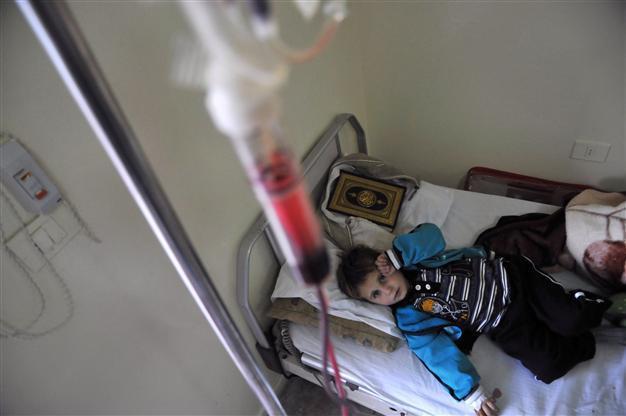Syria's ailing patients: 'Forgotten' victims of war
TRIPOLI - Agence France-Presse

AFP Photo
In a Lebanese clinic, 20-year-old Munif needs regular blood transfusions or else he will die. He is one of thousands of chronically ill Syrians who have become "forgotten" victims of the conflict ravaging their homeland.
Suffering from thalassemia, Munif has premature wrinkles and pale skin.
"I used to get treatment regularly. Now, it's impossible to even go to hospital in Homs (central Syria). Before we made it to this clinic, my family had almost lost hope that I would survive," Munif told AFP.
The nearly 23-month conflict in Syria has not only killed more than 60,000 people, according to the United Nations, but it has also destroyed what was once a robust health system.
Doctors and hospitals in flashpoint regions of Syria have been targets of the war, rights groups say, while health facilities have been paralysed in some areas.
"Heart disease, diabetes and cancer patients need constant follow-up and treatment," said a doctor based in the northern Syrian city of Aleppo -- a battleground for the past six months.
"But lacking medication, specialised doctors, and access to hospitals, they (patients) have become the silent victims of this raging conflict," he told AFP by telephone on condition of anonymity.
Fleeing to Lebanon, a country whose health system is already strained, has also not guaranteed access to treatment, said Tripoli-based Syrian medic Maher al-Kashef.
"Refugee patients in Lebanon are immediately faced with the high cost of drugs and difficulties in accessing a hospital, unlike most wounded," Kashef said.
"Those requiring expensive treatments have to rely on their connections. If someone is willing to cover them, they are saved. If not, they have to wait and if they wait too long, they die." In a report entitled
"Misery beyond the war zone", the medical organisation Doctors Without Borders (MSF) said on Thursday that more than half of the refugees in Lebanon are not receiving the treatment needed because of high costs.
Syrian refugees as well as Palestinians and Lebanese nationals fleeing the embattled country have "profound humanitarian needs that are not being met," said MSF.
"For those who are and are not registered alike, the costs attached to essential primary health care, ante-natal care and institutional deliveries are prohibitive," the organisation said.
Before the war erupted in March 2011, Syrians had a free and "good health system," Franz Luef, head of mission for MSF in rebel-controlled areas of northern Syria, told AFP. "But what we have witnessed now is that the health system has collapsed." Rami Abdel Rahman, head of the Syrian Observatory for Human Rights, said Munif and those like him are "Syria's forgotten victims" of the war. "There are thousands of people who need treatment and can't get any. They die, and nobody talks about them."
The Britain-based Observatory, which compiles daily data of the war's casualties, has been unable to gather figures for patients dying from lack of treatment.
"As if the direct effects of military force on Syrians were not enough, there has also been a full-scale assault on health infrastructure," said Adam Coutts of Cambridge University who authored a study for the Lancet medical journal.
Coutts said the Syrian conflict was "an escalating humanitarian and public health catastrophe." Fifty-five percent of hospitals across Syria have been damaged, out of which 31 percent are out of service, the Syrian health ministry said in a December report.
The worst affected are cities such as Homs and Aleppo where both food and medical services are scarce, experts and residents say.
But against all odds, no epidemic has so far been recorded in Syria, although Lancet study cites "an increased incidence of tuberculosis in urban areas, and particularly in Aleppo and among refugees in neighbouring countries".
"If left unchecked the situation is likely to become out of control," said Coutts.
